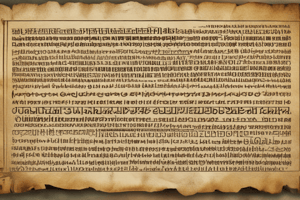Podcast
Questions and Answers
According to the verse, God gave eternal life to believers at the moment of faith.
According to the verse, God gave eternal life to believers at the moment of faith.
True (A)
The life referred to in the verse is possible because believers earned it through good works.
The life referred to in the verse is possible because believers earned it through good works.
False (B)
The verse teaches that believers can boast about their salvation.
The verse teaches that believers can boast about their salvation.
False (B)
The author agrees with Liu's claim about the stark contrast between those who have life and those who don't.
The author agrees with Liu's claim about the stark contrast between those who have life and those who don't.
The verse is referring to the Apostles' Creed.
The verse is referring to the Apostles' Creed.
The life referred to in the verse is only available to those who have faith.
The life referred to in the verse is only available to those who have faith.
The verse teaches that salvation is based on human effort.
The verse teaches that salvation is based on human effort.
The author is preaching in this passage.
The author is preaching in this passage.
The author of 1 John writes to confer authority and kindness to the readers.
The author of 1 John writes to confer authority and kindness to the readers.
The translation of 'I wrote' implies a perfect epistolary in English.
The translation of 'I wrote' implies a perfect epistolary in English.
The writer of 1 John discusses the certainties of the reader's life in Christ in the future realm only.
The writer of 1 John discusses the certainties of the reader's life in Christ in the future realm only.
Eternal life belongs to those who believe in Jesus as a prophet only.
Eternal life belongs to those who believe in Jesus as a prophet only.
The author of 1 John emphasizes the importance of obeying God's commands.
The author of 1 John emphasizes the importance of obeying God's commands.
The writer of 1 John uses the perfect tense to describe the readers' inheritance of eternal life.
The writer of 1 John uses the perfect tense to describe the readers' inheritance of eternal life.
The reader's assurance of eternal life is based on their own efforts.
The reader's assurance of eternal life is based on their own efforts.
The author of 1 John writes to confuse the readers about their eternal state.
The author of 1 John writes to confuse the readers about their eternal state.
The primary purpose of 1 John is to evangelize to those who do not have the Son of God.
The primary purpose of 1 John is to evangelize to those who do not have the Son of God.
The overarching purpose of 1 John is to ensure those who believe in Christ know they have eternal life.
The overarching purpose of 1 John is to ensure those who believe in Christ know they have eternal life.
John's message is not concerned with the concept of fellowship with God and confession of sins for forgiveness.
John's message is not concerned with the concept of fellowship with God and confession of sins for forgiveness.
The commission of Jesus to his followers is to make disciples of the nations.
The commission of Jesus to his followers is to make disciples of the nations.
The presence or absence of the Son of God has no impact on one's eternal destiny.
The presence or absence of the Son of God has no impact on one's eternal destiny.
Those who do not have the Son of God are under no judgment and their course is not set.
Those who do not have the Son of God are under no judgment and their course is not set.
Eternal life is a future possession only, and not a present reality for believers.
Eternal life is a future possession only, and not a present reality for believers.
Those who have the Son of God can have no assurance of eternal life.
Those who have the Son of God can have no assurance of eternal life.
The author of the epistle is addressing believers who are already certain of their spiritual state.
The author of the epistle is addressing believers who are already certain of their spiritual state.
The Bible verse in question is referring to the Apostles' Creed.
The Bible verse in question is referring to the Apostles' Creed.
The author of the epistle is preaching in this passage.
The author of the epistle is preaching in this passage.
The gospel was written to assure believers that they have eternal life.
The gospel was written to assure believers that they have eternal life.
The author breaks up the adjective and its noun for no particular reason.
The author breaks up the adjective and its noun for no particular reason.
The passage is a declaration and not a warning.
The passage is a declaration and not a warning.
The use of 'this life' or 'that life' is unnecessary in the verse.
The use of 'this life' or 'that life' is unnecessary in the verse.
The cross-references in the passage are inconsistent.
The cross-references in the passage are inconsistent.
Jesus' baptism was a historical event where the Father affirmed Jesus as his Son.
Jesus' baptism was a historical event where the Father affirmed Jesus as his Son.
The believer's faith is solely based on mystical experiences.
The believer's faith is solely based on mystical experiences.
John Stott and Lou agree that God's testimony is limited to the threefold testimony of the water, blood, and Spirit.
John Stott and Lou agree that God's testimony is limited to the threefold testimony of the water, blood, and Spirit.
The threefold testimony of the water, blood, and Spirit is described in the perfect tense in the Bible.
The threefold testimony of the water, blood, and Spirit is described in the perfect tense in the Bible.
The blood, water, and Spirit are only historical events and have no present-day significance.
The blood, water, and Spirit are only historical events and have no present-day significance.
The passage is referring to the Apostles' Creed.
The passage is referring to the Apostles' Creed.
The believer's faith is solely based on their own understanding and interpretation of the Bible.
The believer's faith is solely based on their own understanding and interpretation of the Bible.
The passage suggests that salvation is based on human effort and good works.
The passage suggests that salvation is based on human effort and good works.
Flashcards are hidden until you start studying




